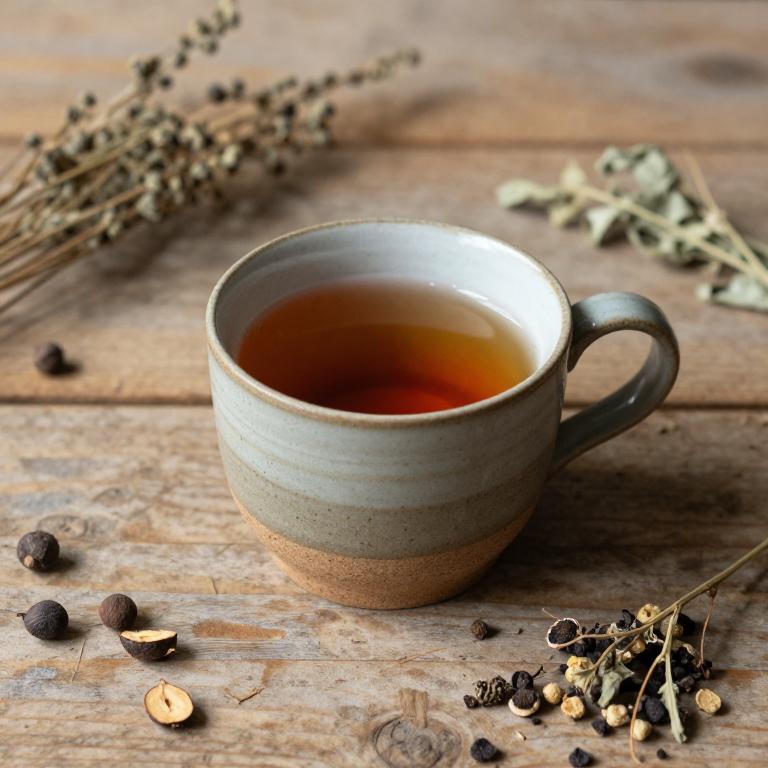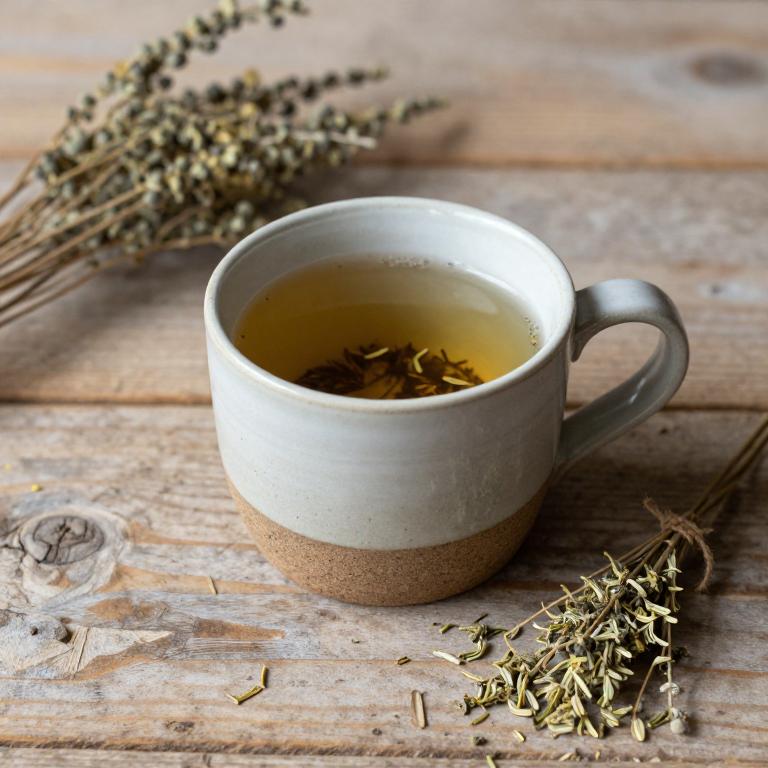10 Best Herbal Teas For Toothache

Herbal teas can be a natural and soothing remedy for relieving toothache symptoms.
Certain herbs like chamomile, clove, and peppermint are commonly used due to their anti-inflammatory and analgesic properties. Chamomile tea, for example, can help reduce gum inflammation and provide a calming effect when applied to the affected area. Clove tea contains eugenol, a natural anesthetic that can numb the pain and reduce swelling. To use these teas, simply steep a few leaves or a pinch of dried herbs in hot water and allow it to cool before using as a mouth rinse or applying it directly to the tooth with a clean cloth.
While herbal teas may offer temporary relief, they should not replace professional dental care for persistent or severe tooth pain.
Table of Contents
- 1. Salvia (Salvia officinalis)
- 2. Black pepper (Piper nigrum)
- 3. Ceylon cinnamon (Cinnamomum zeylanicum)
- 4. Oregano (Origanum vulgare)
- 5. Eucalyptus (Eucalyptus globulus)
- 6. Rosemary (Rosmarinus officinalis)
- 7. Peppermint (Mentha piperita)
- 8. Lemon balm (Melissa officinalis)
- 9. Camellia (Camellia sinensis)
- 10. Fennel (Foeniculum vulgare)
1. Salvia (Salvia officinalis)

Salvia officinalis, commonly known as sage, has been traditionally used in herbal teas to alleviate toothache due to its anti-inflammatory and antimicrobial properties.
The essential oils in sage leaves, such as thujone and cineole, help reduce gum inflammation and combat oral bacteria that may contribute to tooth pain. To prepare the tea, steep a teaspoon of dried sage leaves in hot water for several minutes, then allow it to cool before using it as a mouth rinse or to sip slowly. This natural remedy can provide temporary relief by numbing the area and reducing swelling, making it a gentle alternative to conventional pain relievers.
However, it is advisable to consult a healthcare professional for persistent or severe toothache, as it may indicate a more serious underlying issue.
2. Black pepper (Piper nigrum)

Piper nigrum, commonly known as black pepper, has been traditionally used in herbal teas to alleviate toothache due to its analgesic and anti-inflammatory properties.
The active compound, piperine, helps reduce pain and inflammation by inhibiting the release of pain-inducing chemicals in the body. To prepare the tea, a teaspoon of black pepper is added to boiling water and allowed to steep for several minutes. While it may provide temporary relief, it is not a substitute for professional dental care.
This herbal remedy is often combined with other spices like clove or cinnamon to enhance its effectiveness in soothing dental pain.
3. Ceylon cinnamon (Cinnamomum zeylanicum)

Cinnamomum zeylanicum, commonly known as cinnamon, has been traditionally used in herbal teas to alleviate toothache due to its antibacterial and anti-inflammatory properties.
The essential oils in cinnamon, particularly cinnamaldehyde, help reduce pain and inflammation in the gums and surrounding tissues. When brewed into a warm herbal tea, cinnamon can provide a soothing effect that may ease the discomfort of a toothache. It is often combined with other herbs like clove or ginger to enhance its pain-relieving properties.
However, while cinnamon tea may offer temporary relief, it should not replace professional dental care for persistent or severe tooth pain.
4. Oregano (Origanum vulgare)

Origanum vulgare, commonly known as oregano, is often used in herbal teas to help alleviate toothache due to its antimicrobial and anti-inflammatory properties.
The essential oils in oregano, particularly carvacrol and thymol, have been shown to reduce bacterial growth and soothe gum inflammation, which are common causes of tooth pain. To prepare the tea, dried oregano leaves are steeped in hot water for several minutes, allowing the active compounds to infuse into the liquid. Drinking this tea can help reduce swelling and discomfort associated with dental issues.
While it may provide temporary relief, it is recommended to consult a dentist for proper diagnosis and treatment of persistent tooth pain.
5. Eucalyptus (Eucalyptus globulus)

Eucalyptus globulus, commonly known as eucalyptus oil, has been traditionally used for its antiseptic and anti-inflammatory properties, making it a popular ingredient in herbal teas for alleviating toothache.
When brewed into a tea, eucalyptus globulus can help reduce gum inflammation and soothe the pain associated with dental issues. Its menthol-like compounds provide a cooling effect that may numb the area and ease discomfort. However, it is important to consult a healthcare professional before using it, especially if the toothache is severe or persistent.
While herbal teas can offer temporary relief, they should not replace professional dental care.
6. Rosemary (Rosmarinus officinalis)

Rosmarinus officinalis, commonly known as rosemary, has been traditionally used in herbal teas to alleviate toothache due to its antimicrobial and anti-inflammatory properties.
The essential oils in rosemary, such as cineole and camphor, can help reduce inflammation and kill bacteria that may contribute to dental pain. Drinking rosemary tea can act as a natural remedy by soothing the gums and reducing the sensation of pain. It is often recommended to steep fresh or dried rosemary leaves in hot water for several minutes to maximize its therapeutic benefits.
While rosemary tea may offer relief, it should not replace professional dental care for persistent or severe toothaches.
7. Peppermint (Mentha piperita)

Mentha piperita, commonly known as peppermint, is often used in herbal teas to alleviate toothache due to its cooling and analgesic properties.
The menthol in peppermint oil helps to numb the pain and reduce inflammation in the mouth, providing temporary relief from dental discomfort. Peppermint tea can also help to soothe sore gums and reduce the sensation of tooth sensitivity. It is typically consumed by steeping fresh or dried peppermint leaves in hot water for several minutes.
While it is not a substitute for professional dental care, peppermint herbal tea can be a natural and calming remedy for minor toothaches.
8. Lemon balm (Melissa officinalis)

Melissa officinalis, commonly known as lemon balm, is a medicinal herb that has been traditionally used for its calming and soothing properties.
While it is not a primary remedy for toothaches, some people use lemon balm herbal teas to help alleviate the stress and anxiety often associated with dental pain. The tea contains compounds that may have mild analgesic and anti-inflammatory effects, which could provide some relief when consumed regularly. To prepare the tea, simply steep a teaspoon of dried lemon balm leaves in hot water for several minutes.
Although it should not replace professional dental care, lemon balm tea may serve as a complementary remedy to ease discomfort and promote relaxation during a toothache episode.
9. Camellia (Camellia sinensis)

Camellia sinensis, the plant from which green and black teas are derived, contains compounds that may help alleviate toothache due to their anti-inflammatory and analgesic properties.
The polyphenols in Camellia sinensis, particularly catechins, can reduce inflammation and inhibit bacterial growth, which are common causes of tooth pain. While not a substitute for professional dental care, drinking herbal teas made from Camellia sinensis may offer temporary relief by soothing gum irritation and reducing swelling. Some studies suggest that the antioxidants in these teas can support oral health by strengthening teeth and reducing plaque buildup.
However, it is important to consult a dentist for persistent or severe tooth pain, as herbal remedies should complement, not replace, medical treatment.
10. Fennel (Foeniculum vulgare)

Foeniculum vulgare, commonly known as fennel, has been traditionally used in herbal teas to alleviate toothache due to its antiseptic and anti-inflammatory properties.
The essential oils in fennel, particularly anethol, help reduce inflammation and soothe gum irritation, making it a natural remedy for dental discomfort. To prepare the tea, dried fennel seeds are steeped in hot water for several minutes, allowing the active compounds to infuse into the liquid. Drinking this tea can help relieve mild tooth pain and reduce oral infections by promoting a healthier oral environment.
While it may offer temporary relief, it is advisable to consult a dentist for persistent or severe toothache issues.